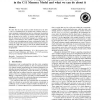Free Online Productivity Tools
i2Speak
i2Symbol
i2OCR
iTex2Img
iWeb2Print
iWeb2Shot
i2Type
iPdf2Split
iPdf2Merge
i2Bopomofo
i2Arabic
i2Style
i2Image
i2PDF
iLatex2Rtf
Sci2ools
POPL
2015
ACM
2015
ACM
Common Compiler Optimisations are Invalid in the C11 Memory Model and what we can do about it
We show that the weak memory model introduced by the 2011 C and C++ standards does not permit many common source-tosource program transformations (such as expression linearisation and “roach motel” reorderings) that modern compilers perform and that are deemed to be correct. As such it cannot be used to define the semantics of intermediate languages of compilers, as, for instance, LLVM aimed to. We consider a number of possible local fixes, some strengthening and some weakening the model. We evaluate the proposed fixes by determining which program transformations are valid with respect to each of the patched models. We provide formal Coq proofs of their correctness or counterexamples as appropriate. Categories and Subject Descriptors D.3.1 [Programming Languages]: Formal Definitions and Theory; D.3.3 [Programming Languages]: Language Constructs and Features Keywords Concurrency; Weak memory models; C/C++; Compilers; Program transformations
| Added | 16 Apr 2016 |
| Updated | 16 Apr 2016 |
| Type | Journal |
| Year | 2015 |
| Where | POPL |
| Authors | Viktor Vafeiadis, Thibaut Balabonski, Soham Chakraborty, Robin Morisset, Francesco Zappa Nardelli |
Comments (0)

